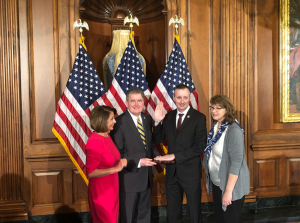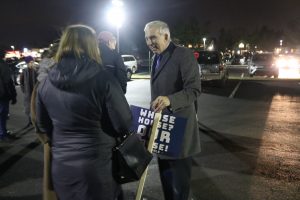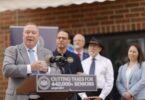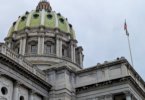
Speaker of the House Nancy , former Congressman Mike Fitzpatrick, Republican Congressman Brian Fitzpatrick, and Mike Fitzpatrick’s wife Kathy.
Credit: Office of Congressman Brian Fitzpatrick
Congressman Brian Fitzpatrick was sworn in for his second term Thursday in Washington D.C.
The congressman, similar to his first swearing in two years ago, accompanied the event with the introduction of a package of legislation that he intends will reform Congress and “increase executive branch accountability and transparency.”
“It is an honor to represent and serve the people of Bucks and Montgomery counties in the 116th Congress. I look forward to serving as their independent voice in Washington during a time when our citizens face a dysfunctional, hyper-partisan, and broken Washington,” said Fitzpatrick. “I believe that these ideas introduced today transcend political parties and strike at the heart of what our country needs: a rebirth of belief in our leaders and institutions so we can tackle the challenges we face and accomplish great things in this new era.”
Fitzpatrick voted for Republican Congressman Kevin McCarthy of California, a common choice for GOP representatives, to become the next Speaker of the House. However with a Democratic majority, Democratic Congresswoman Nancy Pelosi of California won the role.
During the election in fall, Fitzpatrick stated that members of the bipartisan Problem Solvers Caucus would vote for a Speaker of the House who supported the group’s “Break the Gridlock” legislation. McCarthy does not appear to have backed the entire Break the Gridlock package of legislation.
UPDATED: 9:58 p.m., Thursday: Fitzpatrick’s office said he voted for McCarthy because the Republican supports more of the Break the Gridlock ideals than Pelosi.
During an evening vote, Fitzpatrick, a resident of Middletown, broke with Republicans to vote for the Democratic rules package that is aimed at moving bills with a wide range of bipartisan support to be considered more quickly. He was one of three Republicans to do so.
“I am hopeful these new rules create a more effective and bipartisan institution. I continue to strongly oppose the attempt to dismantle the Affordable Care Act in federal court, which threaten patient protection provisions. Last Congress, I supported The Maintaining Protections for Patients with Pre-Existing Conditions Act, which protects Americans with pre-existing conditions from being denied coverage. The rules package that I voted for today allows the House to defend Americans with pre-existing conditions, and Democratic leadership must use this authority to protect patients with pre-existing conditions. I will continue to fight for affordable, accessible, and quality healthcare for all Americans,” Fitzpatrick said in a statement.
Fitzpatrick was expected on Thursday night to approve a Democratic-backed bill to reopen the government nearly two weeks after the shutdown started over Republican Donald Trump’s demand for billions to construct his border wall. Before the shutdown, Fitzpatrick did vote in favor of a spending plan to give $5.7 billion for what Trump has said will be a “great, great wall on our southern border.”
What has changed since Fitzpatrick’s first term has been the balance of power in the House of Representatives. Democrats have a 235 to 199 majority over Republicans in the 116th United States Congress. The GOP still holds a majority in the U.S. Senate and White House.
Fitzpatrick has framed himself as a moderate who works to compromise in the face of the a political atmosphere divided by extreme partisanship. Fitzpatrick did not vote for Trump in 2016.
Only hours after Fitzpatrick was sworn in, demonstrators – associated with left-wing Indivisible groups – gathered outside his office overlooking the Newtown Bypass at One Summit Square in Middletown. The group of about 50 people voiced their support for H.R. 1, a Democratic-backed bill that would tackle voting rights, campaign finance, and a lobbying reform.
Karen Rodriguez, who helped organize the event, said she hoped the congressman would support the proposal and also host town halls to hear from constituents.
Those in attendance also filled out a petition to support H.R. 1 and also to reopen the government. The petitions were expected to be delivered to Fitzpatrick’s office staff.
“We in Pennsylvania’s First Congressional district need to take advantage of this moment to remind Representative Fitzpatrick of the promises about bipartisanship he made on the campaign trail. A great first step to prove his statements were not just convenient words is for him cosponsor and vocally promote H.R. 1, the new ethics package,” said Kierstyn Piotrowski Zolfo, a Bucks County residents involved in the statewide Indivisible group.
Also in attendance at the event was former Democratic congressional candidate Scott Wallace. He said he was there to keep the grassroots efforts strong and continue the momentum to reform Washington D.C.
Below is the legislation pushed by Fitzpatrick in his second term, according to a press release from his office:
Term Limits for Members of Congress (Constitutional amdt.)
Limits congressional terms to twelve years in both chambers, six two-year terms in the House and two six-year terms in the Senate.
No Budget, No Pay (Constitutional amdt.)
Prevents members of Congress from being paid if Congress fails to pass a budget or allows a lapse in appropriations. Goes further than previous iterations of No Budget, No Pay by docking pay for time without a budget as opposed to simply putting member salaries in escrow until end of term. This measure requires complete forfeiture.
Balanced Budget Amendment (Constitutional amdt.)
Requires Congress to adopt a budget that balances like most states, including Pennsylvania, and municipalities.
Clean Congress Act (H.R.)
Requires Congress to act on single-issue legislation
Codifies that all laws passed by Congress must apply to its membersClean Public Service Act (H.R.)
Ends Congressional “pensions for life” and directs members toward standard 401K retirement savings accounts
Clean Elections Act (H.R.)
Reforms the broken “Gerrymandering” process by moving all redistricting to independent, non-partisan commissions
Allows access to political party primaries for Independents or non-affiliated votersCabinet Service Integrity Act (H.R.)
Prohibits cabinet members and their immediate family from soliciting donations from foreign sources. High-ranking federal officials should not use their office or status as influential political officials to solicit funds from overseas entities.
Presidential Tax Transparency Act (H.R.)
Mandates the Secretary of the Treasury to disclose and make publicly available tax returns and return information of presidential and vice-presidential candidates filed within the 10 tax years preceding the year in which the individual becomes a candidate.









